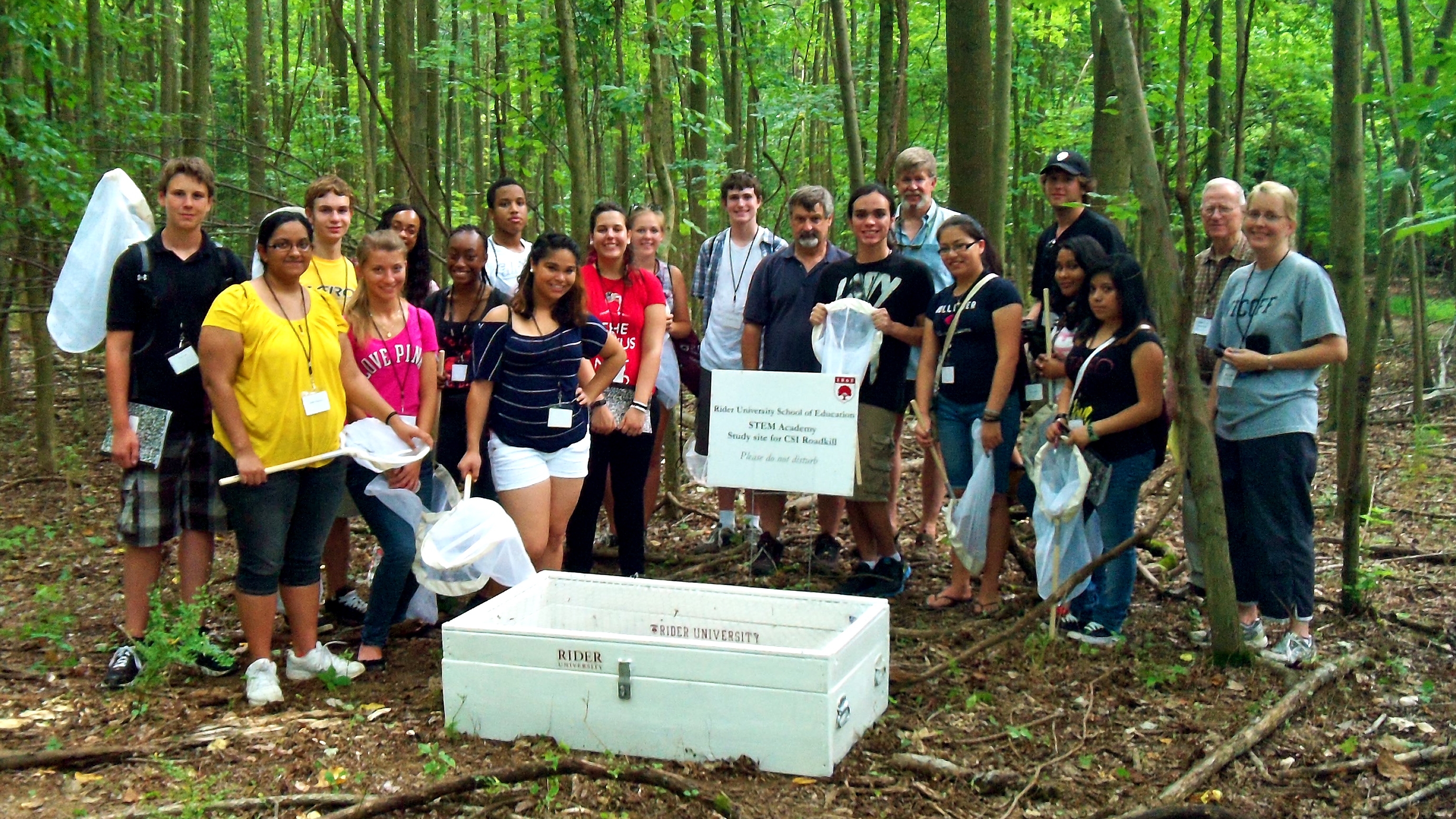Tuesday, Jul 31, 2012
Local high school students used the STEM disciplines - Science, Technology, Engineering and Mathematics - during the School of Education’s intensive two-week program.
Rider University has earned its share of renown for the learning that occurs within the walls of its classrooms, labs and studios, but for two weeks in July, the scene shifted to the woods on the outer bounds of the Lawrenceville campus.
Through funding from Janssen Pharmaceuticals and Bristol-Myers Squibb, 16 local high school students participated in Rider’s third annual School of Education STEM Teacher Academy – CSI: Roadkill from July 16 to 27. Drawing inspiration from television’s forensics-based crime dramas, the students observed the decomposing carcasses of two pigs to learn about key ecological concepts such as predation, competition, and succession by observing the interactions among the various decomposition agents that appeared at the study site.
By identifying and measuring variables, discussing them, and then creating displays to present the data, students learned to be successful investigators while employing each of the STEM disciplines: Science, Technology, Engineering and Mathematics.
“The CSI: Roadkill investigation shows that nothing is wasted in nature and that everything is interdependent. With the two pigs in different locations, we are observing the ecosystems that the pig creates,” said Monika Prorok, a senior at Lawrence Township High School. “Because of the small class size, I am experiencing things that I may never have gotten to otherwise.”
The STEM Teacher Academy actively engages students in hands-on science activities and increases awareness of the value and rewards of a teaching career in the STEM areas. Additionally, students have opportunities to collaborate with others who share an interest in different science disciplines and desire careers in the field of education. The techniques and awareness acquired through the STEM program provide a set of science and technological skills that are transferrable to future investigations.
“Initially, I wanted to go into astronomy but this internship has opened my eyes to so many other fields of science. I am now looking into a career in geology or forensic science. This is all so new and interesting; I love it,” said Gabrielle McRae, a junior at Ewing High School.
Students employed a variety of technologies during the program, including iPads with Google Earth, 123D, and Evernote applications. Students also familiarized themselves with the use of a wildlife trail camera and HOBO pendant temperature data loggers with corresponding software. Using tools such as these, students designed investigations, conducted research, analyzed their data and presented their research to peers and science educators.
“The technology we are using allows us to continuously monitor the environment. You don’t necessarily have to be there to see what is going on at our site,” explained Dr. Peter Hester, associate professor of Teacher Education, who directs the program along with Dr. Sven Strnad, a fifth-grade teacher at Millstone River Elementary School in Plainsboro, N.J. “This allows students to ask new questions and gives them the experience of using professional, industry standard equipment.”
With assistance from Rider University science faculty, STEM Academy students also completed an insect collection, reconstructed specimens from the skeletal remains of a pig and a frog, collected 70-million-year-old fossil shark teeth, examined aquatic organisms to assess water quality, and used Global Information Systems to interpret past landscapes.
“With our national need for highly qualified mathematics and science teachers, programs such as this are essential,” said Dr. Sharon Sherman, dean of the School of Education. “We attract talented high school students who delve deeply into important science and mathematics concepts. They gain greater content knowledge and have the opportunity to explore teaching as a career.”
“I’m interested in being a teacher, so all that I am learning here can help me better prepare for my classroom,” said Christopher Muzi, a student at Lawrence Township High School. “I want to teach the elementary grades, and I know that the experiments I am conducting here would thrill younger students.”
For more information on the Rider University’s STEM Teacher Academy, please visit their wikispace at www.riderstem.wikispaces.com.
For more information about Rider University School of Education programs and courses go to www.rider.edu/education.

